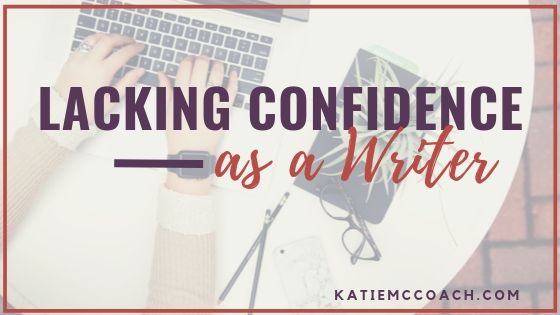Let’s tackle those confidence issues, writer.
As I listen to the struggles of the writing community, one thing I see come up time and time again is writers stating they lack confidence. They’ll ask, “How can I be more confident in my work?”
Is this you as well?
I believe there are five reasons why writers lack confidence in their own work.
1. They haven’t put in all the efforts they know they need in order to grow.
These writers know there is more to do to develop their writing, but they haven’t done it yet. The lack of confidence comes from knowing they have further to go and haven’t made those efforts yet.
2. They don’t know how to grow.
These writers are slightly different than #1, because they are ready to make the efforts, but they have no idea how to do so. They are overwhelmed. How do they develop their work? Do they go to an editor? Use critique partners? Read craft books?
3. They’ve received conflicting advice.
These writers have read articles and gotten feedback from critique partners and beta readers and maybe even editors, but all of the advice contradicts each other. They don’t know the right advice to take. What’s going to work for them. How does one root out the good advice from the bad?
4. They need validation, or, they don’t know their strengths.
Have you gone to a critique partner or group event and only received feedback on what you’ve done “wrong” or need to change? If you are only hearing the struggles you must overcome, it’s easy to lack confidence in your work.
We often ache for validation from others, but we don’t ask for it, and we typically don’t receive it. This is especially true in the times when we ask for feedback. This is not usually because someone is being mean, it’s just that they want to help you with the parts that need help, and assume you know the good parts already. I had a professor who once gave me mounds of feedback on my work and I was crushed. I was so proud of that piece, it held so much of my heart, and she gave me an exhaustive list of things to enhance. After struggling with the feedback and losing confidence in my writing, she finally said to me one day, “You know you’re a good writer. I don’t need to tell you that.” YES YOU DO, I wanted to scream.
5. They don’t know their weak points.
Not knowing our strengths is one thing, but what if we don’t know our weaknesses? When we know where we fall short in our stories and writing (and in life), we can work to improve and grow those areas. And thus, our confidence in those areas will grow.
Is this you?
Have you found yourself in one of these categories at any given time in your writing career?
The good news is, there is a way to gain your confidence back.
People in #1 require taking a step forward. It does not need to be a leap. One step at a time will further this writer along and grow their knowledge base, thus growing their confidence in what they know about the writing process and journey.
Folks in #2 will find value in following the strategies of others who have done this before. This may be in the case of following the method of one person, or doing broad research to learn of the efforts of many and determining a system that works best for them.
For a general guideline: start with the first draft, revise a few times as you read through it, read 2-3 craft books/articles and apply your learnings and revise, work with critique partners and revise again, then talk to a developmental editor and revise from there. An editor or trusted writing friend will be able to point you in the next best direction.
This is just a general approach though, as this is a broad starting point where many writers begin. I am actually currently creating an online program with specific strategies for attacking this very topic.
As for # 3, we’ve all likely been, or will be, in this group. Fortunately, there is a way to sort through the conflicting advice and find the truth that is right for you. My quick tip: find the core of the feedback. You could get conflicting advice on a main character, but the core of the reason may be because the character is not fulfilling what the reader expected based on what’s on the page. For more tips for applying constructive criticism, This article may help: You Want Me to Change THAT?
Those in #4 need to only ask for validation. Ask your writing crew to help you determine your strengths. What are you best at? And what do they love about your work? Ask for the things they positively respond to in your writing. Knowing what you do well is just as important as knowing what to grow. Also, what a shame it would be if you got rid of something that made your work stand out?
A lack of confidence comes when you don’t know what in your writing people connect with. Once you figure out what part of your work people really connect to and appreciate and want more of, then you’ll be more confident in what you can deliver.
And finally, folks in #5 can learn what in their writing or stories they ought to spend time on developing. By putting in that effort to grow, they will get stronger in those areas. And naturally, their confidence will grow too.
Are you any of these five writers?
Are there other ways you’ve struggled with confidence? If so, reply and let me know. I’d love to hear what worked for you, OR, I’d be happy to help you rectify that insecurity.
PS. Get your free Poppin’ Query Letter Template here.



 Download your free copy of these 8 tried-and-true strategies to stop self-doubt and imposter syndrome as a writer. And, build the power to resist it in the future.
Download your free copy of these 8 tried-and-true strategies to stop self-doubt and imposter syndrome as a writer. And, build the power to resist it in the future.